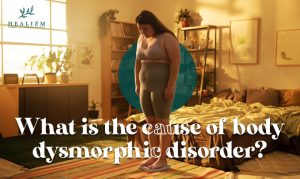
Body Dysmorphic Disorder (BDD) is a condition in which you feel insecure about your appearance.
People with BDD constantly worry about their appearance.
People in need of assistance can benefit from mental health support services.
For better treatment, seek out Healizm.
In the post below we’ll discuss what is the cause of body dysmorphic disorder and how to overcome it.
Body Dysmorphic Disorder
Body Dysmorphic Disorder (BDD) is when someone feels uncomfortable with their physical appearance.
The feeling is so intense that people with BDD cannot live a normal life.
A mental health professional may be able to assist someone with BDD.
Talking to a therapist can assist these individuals feel better about themselves and live normally again.
If you know someone dealing with this, encouraging them to talk to a professional can make a difference.
To get more help and support, contact us.
Some resources:
Body Dysmorphic Disorder DSM 5
Body dysmorphic disorder is listed in the Diagnostic and Statistical Manual of Mental Disorders, Fifth Edition (DSM-5) under the Obsessive-Compulsive and Related Disorders section.
The diagnostic criteria include a focus on one or more perceived defects or flaws in physical appearance that are not observable or appear slight to others.
Similarly, in response to the appearance concerns, the person must involve in repetitive behaviors or mental acts.
Body Dysmorphic Disorder Symptoms
- You’re very concerned about something in your appearance that others might not even notice or think is minor.
- You are strongly convinced that you have an imperfection making you look unattractive or repulsive.
- You think others look at you badly or make fun of you because of your appearance.
- You do things like checking the mirror excessively or attempting to fix flaws or hide them.
- You’re constantly comparing how you look to others.
What Is the Cause of Body Dysmorphic Disorder?
What is the cause of body dysmorphic disorder? There are a lot of causes for body dysmorphic disorder. These include:
- Genetic factors.
- Environmental influences.
- Irregularities in the brain’s processing of serotonin.
- Looking at what is considered “beautiful” in magazines or on TV may lead to BDD.
- Having had bad experiences when you were younger such as being bullied over your appearance or childhood trauma.
- Having problems with being anxious or sad before might make you more likely to have BDD.
Body Dysmorphia vs. Dysphoria
| Body Dysmorphia | Dysphoria |
| An obsessive focus on perceived flaws in one’s physical appearance, often minor or imagined. | A profound state of unease or dissatisfaction with one’s body or life situation. |
| Recognized as a mental disorder in the DSM-5. | Can be a symptom of other conditions such as gender dysphoria or depression. |
| Distress or impairment in social, occupational, or other areas of functioning due to preoccupation with appearance. | Discomfort, stress, and anxiety about one’s body or gender incongruence, leading to a strong desire to alter one’s body or gender expression. |
| Mirror checking, excessive grooming, skin picking, and seeking reassurance. | Might behave in a way to align their appearance with their gender identity. |
Final Thoughts
If you or someone you’re close, to is showing signs of BDD it’s crucial to reach out to a professional, for diagnosis and effective care.
For that, you may contact us at Nahil Psychiatry Services PLLC.
FAQs
What are the environmental causes of body dysmorphic disorder?
Body Dysmorphic Disorder (BDD) seems to be more connected to our genes and how our brains work rather than things in our environment.
However, the way society, media, and culture talk about looks could play a role in making some people more likely to have BDD.
What is the cause of facial dysmorphia?
Facial dysmorphia can arise from our genes and brains work, but also because of things around us, for example, what society thinks is beautiful and our own experiences.
What is the biological explanation for body dysmorphic disorder?
Some people with body dysmorphic disorder (BDD) might have:
- Brains wired differently: Their brains may be wired differently when it comes to how they perceive themselves and feel about their appearance.
- Genes that make it more likely: A family member with BDD might be more likely to have it, as well.
